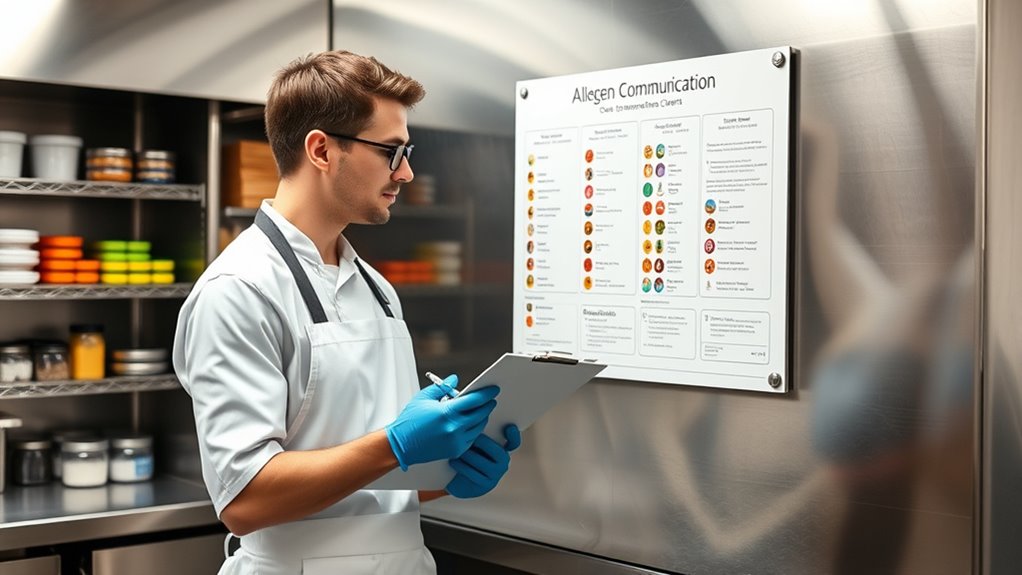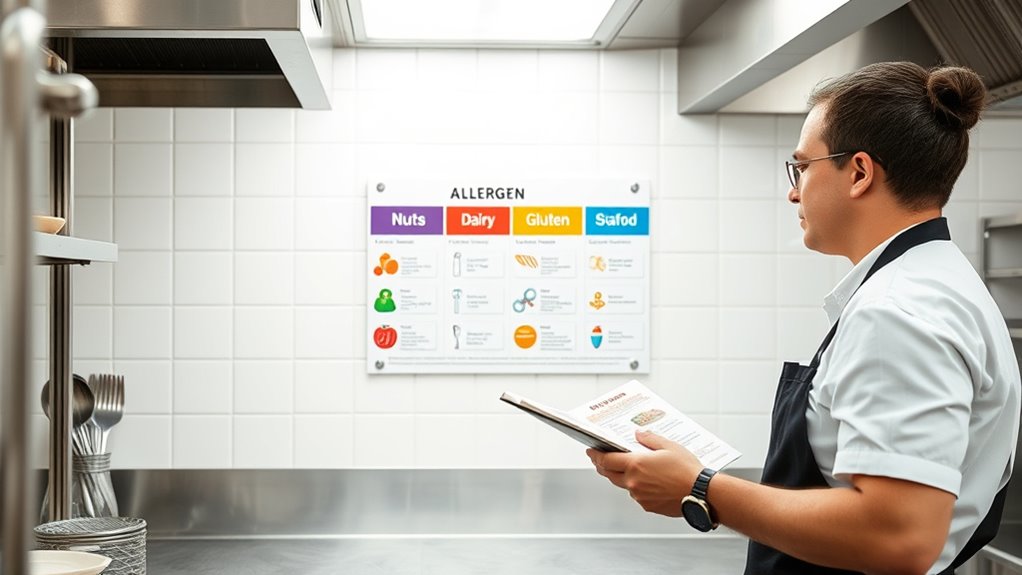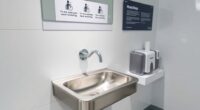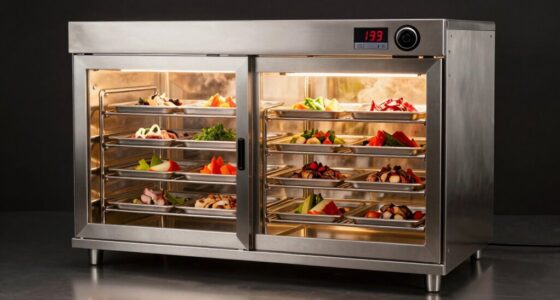To follow allergen communication protocols, you should clearly identify and verify allergen information on labels and ingredients. Always communicate openly with customers about potential risks and ask questions to confirm their allergies. Maintain clean workspaces to prevent cross-contact, and document procedures for handling allergy requests. Stay updated on policies and practice effective communication with team members. Consistently applying these steps helps guarantee safety; keep going to discover more ways to protect your customers.
Key Takeaways
- Establish clear procedures for verifying allergen information with suppliers and updating labels regularly.
- Train staff to ask customers specific questions about allergies and communicate clearly about menu options.
- Maintain clean workspaces and proper food separation to prevent cross-contact during preparation and service.
- Develop protocols for handling allergen-related incidents swiftly, including customer communication and incident documentation.
- Foster a safety culture by encouraging open dialogue, continuous education, and team accountability in allergen management.

Effective allergen communication is essential for ensuring consumer safety and maintaining trust in food service and manufacturing. When it comes to protecting customers with allergies, clear and accurate allergen labeling is your first line of defense. It’s vital that labels are straightforward, easy to understand, and consistently updated to reflect any recipe changes or new ingredients. Proper allergen labeling helps staff quickly identify potential risks and communicates vital information to consumers, reducing the chance of accidental exposure. As a food professional, you must understand that accurate labeling isn’t just a legal requirement; it’s a moral obligation to keep your customers safe.
Clear, accurate allergen labels are vital for consumer safety and trust in food service.
Staff training plays a crucial role in effective allergen communication. You need to ensure that every team member understands the significance of allergen management, how to interpret allergen labels, and the proper procedures for handling allergy-related requests. Well-trained staff can recognize the severity of food allergies and respond appropriately. This includes knowing how to ask the right questions when a customer inquires about ingredients, how to prevent cross-contact during food preparation, and how to handle allergen-related incidents swiftly. Regular training sessions reinforce this knowledge, keeping staff updated on any changes in allergen policies or labeling practices. When everyone on your team is educated and vigilant, the chances of miscommunication decrease considerably.
Moreover, staff training isn’t a one-time event; it should be an ongoing process. You should establish clear protocols for allergen communication, making sure your team knows exactly what steps to take from order receipt to delivery. This includes understanding the importance of verifying allergen information with suppliers, maintaining clean workspaces to prevent cross-contact, and accurately communicating allergen information to customers. Role-playing scenarios and practical exercises can help staff internalize these procedures, ensuring they react confidently and correctly in real situations. Additionally, understanding the role of color accuracy in food presentation can help staff better communicate the visual aspects of allergen-safe dishes.
In addition, fostering an environment where staff feel comfortable asking questions or reporting concerns about allergen management is key. Encourage open communication and continuous learning. By doing so, you create a safety culture that prioritizes allergen awareness and minimizes risks. Remember, effective allergen communication isn’t just about passing on information; it’s about building a team that understands its responsibility to protect every customer. Combining meticulous allergen labeling practices with comprehensive staff training creates a robust defense against allergen-related incidents, safeguarding your customers and enhancing your reputation.
Frequently Asked Questions
How Often Should Staff Receive Allergen Communication Training?
You should schedule allergen awareness training for staff at least every six months. Regular staff training frequency helps guarantee everyone stays up-to-date on allergen communication protocols and maintains high allergen awareness. Prompt refresher courses reinforce best practices, reduce risks, and keep staff confident in handling allergen-related situations. Consistent training also demonstrates your commitment to food safety and customer well-being, making it easier to prevent cross-contact and manage allergen concerns effectively.
What Are the Legal Requirements for Allergen Labeling?
Imagine a customer with severe nut allergies. Legally, you must guarantee allergen labeling is accurate and clearly states allergen severity. Regulations like the Food Allergen Labeling and Consumer Protection Act require labels to list major allergens and avoid misleading info. You’re responsible for maintaining label accuracy to protect consumers and avoid legal issues. Regularly review your labels, stay updated on regulations, and prioritize clear communication to meet legal standards and safeguard your customers.
How to Handle Customer Allergy Disclosures Effectively?
When a customer discloses an allergy, you should listen carefully, confirm their needs, and document the details. Practice cross contamination prevention by sanitizing surfaces and using separate utensils. Advocate for your customers by communicating clearly with the kitchen team and offering allergen-free options. Always reassure them that their safety is your priority, and double-check that their meal meets their allergy requirements before serving.
What Tools Assist in Allergen Information Management?
You can streamline allergen data management with specialized communication software designed for this purpose. These tools help you organize and update allergen information effortlessly, ensuring staff always has access to accurate details. By using such software, you minimize risks and foster trust with your customers. The right tools make allergen information management more efficient, allowing you to focus on providing a safe and welcoming environment for everyone.
How to Update Staff on New Allergen Information?
You should promptly follow allergen update procedures by using staff notification methods like team meetings, emails, or digital alerts to inform everyone of new allergen information. Guarantee updates are clear, concise, and easily accessible. Regularly review and reinforce these procedures so staff stays current. By maintaining consistent communication, you help prevent cross-contact risks and protect your customers from allergen-related incidents.
Conclusion
By mastering these allergen communication protocols, you hold the power to transform every dining experience into a fortress of safety. Your clear, confident communication can thwart even the most stubborn allergic reactions, preventing disasters before they start. When you implement these strategies flawlessly, you become an unstoppable guardian of customer well-being, turning what seems like a simple conversation into an extraordinary act of life-saving heroism. Remember, your words are your ultimate shield—wield them wisely.









